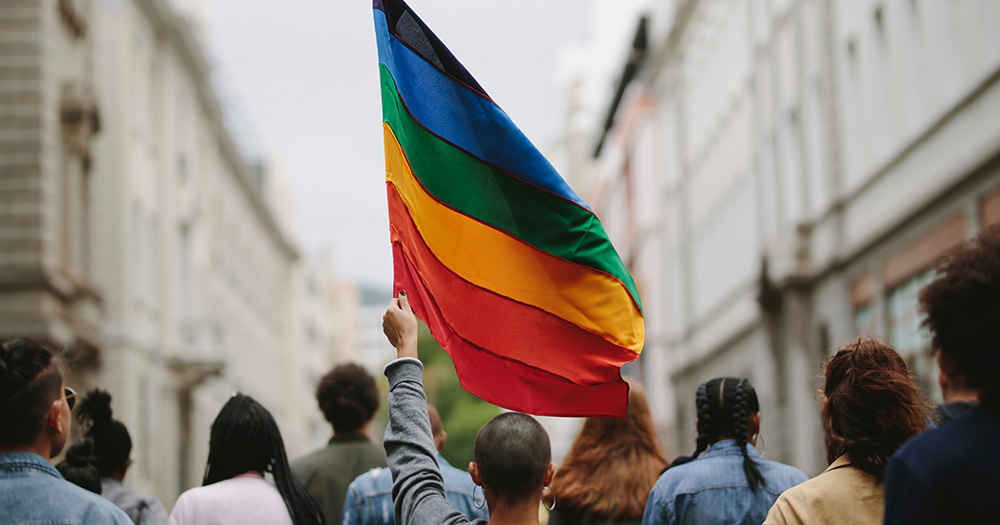“So, who’s the one wearing the dress?”, “You must be confused,” and “When’s straight pride?” Surely, an annoyed shiver has run up quite a few spines upon hearing those phrases. These are just some of the terms we hear on a daily basis, that constant buzz which reminds members of the LGBTQ+ community exactly why it’s imperative to celebrate Pride now in 2024 more than ever.
As we gather our flags, fans and fighting spirit to celebrate this year’s Pride, our friends and fellow queer individuals stand together in a time of celebration, remembrance and defiance against a homophobic and transphobic system.
What started as a riot in America to protest killings, oppression and our LGBTQ+ friends and family being refused to love and live as their truest selves, has spread throughout the rest of the world, one message remaining relevant amongst queer individuals of all walks of life and throughout history: We’re tired of it.
So, as a domino effect, the Stonewall Riots in America became a catalyst for the rest of the world, one act from Black, trans queer women to force eyes upon a deeply normalised and deeply devastating treatment of all targeted relatives. Now, as time ticks on, our different neighbours throughout the world begin to follow suit, one step at a time, in the name of queer liberation. Pride is a march of remembrance, to give credit where due- our leading friends have rocked the strict world of gender roles and heteronormative labels, which unravels the road ahead for us even now.
And let us not forget the birth of Ireland’s fight for LGBTQ+ rights, beginning with the formation of the Sexual Liberation Movement (SLM) in 1973. From there, 1974 saw the first Pride demonstration in the country, with a small group of activists marching from the Department of Justice to the British Embassy to call for the decriminalisation of homosexuality.
The cruel beating and murder of Declan Flynn, an Irish gay man, in 1982, led to an uproar in demand for a change; this demand called for a more substantial LGBTQ+ rights movement throughout the country. Because of one cruel and brutish act, more eyes turned on those who challenged LGBTQ+ siblings’ way of life and liberty, and as we look around, we see the strength of our prevalence shining through today.
As of May this year, 37 countries have recognised same-sex marriage. “Okay, we’ve recognised you exist. You have same-sex marriage in your country, you have a month of celebrating and you’ve got your moment in the spotlight. Are you happy now?”
There is a simple answer to that: no. We are so glad to have what we do now, and there’s so much for us to enjoy, but we’ve still got a lot ahead of us. As of now, 67 countries still have laws criminalising consensual same-sex relationships and at least nine countries criminalise gender expression, in which transgender and gender-nonconforming folks are a special target. At least 12 countries impose the death penalty for same-sex relationships and homosexuality, some being a death sentence of stoning.
Until there is pride and equality for all, we still have quite a fight on our hands in 2024 and beyond. We can’t simply put a rainbow sticker on a car window or organise a few events and marches in the name of Pride. We cannot let our voices die down in order to allow someone else to feel comfortable. The LGBTQ+ community has never truly faced comfort; the sting and burn and bruise of the constant fight has been far from comfortable. But in the face of adversity, what must we do?
When it comes to our survival and ability to thrive, we must demand, not ask. We still await a ban on so-called ‘conversion therapy’ in Ireland, as well as comprehensive hate crime and hate speech legislation and legal equality for same-sex parents having children through surrogacy. Around the world, queer identities are still labelled as ‘mental illnesses’ that should be ‘treated.’
If celebrating and pushing towards a better tomorrow for our friends of Dorothy is ‘annoying’ or ‘obnoxious,’ then the work is going swimmingly. The more noise we make – the more we gather and show that we are here – the more we will force eyes to look upon the issues at hand. Look among friends within the community who need support: queer business owners, working individuals and those who may need help to get to safety and security. Getting recognition for our efforts is fantastic, but we must support ourselves, our siblings and our friends who may need an extra hand during this time.
So here’s to celebrating another year of bravery, love, friendship and showing all just who we are! Let us pick ourselves back up by the shoe shoestrings and march into a happy Pride in 2024!
© 2024 GCN (Gay Community News). All rights reserved.
Support GCN
GCN is a free, vital resource for Ireland’s LGBTQ+ community since 1988.
GCN is a trading name of National LGBT Federation CLG, a registered charity - Charity Number: 20034580.
GCN relies on the generous support of the community and allies to sustain the crucial work that we do. Producing GCN is costly, and, in an industry which has been hugely impacted by rising costs, we need your support to help sustain and grow this vital resource.
Supporting GCN for as little as €1.99 per month will help us continue our work as Ireland’s free, independent LGBTQ+ media.
